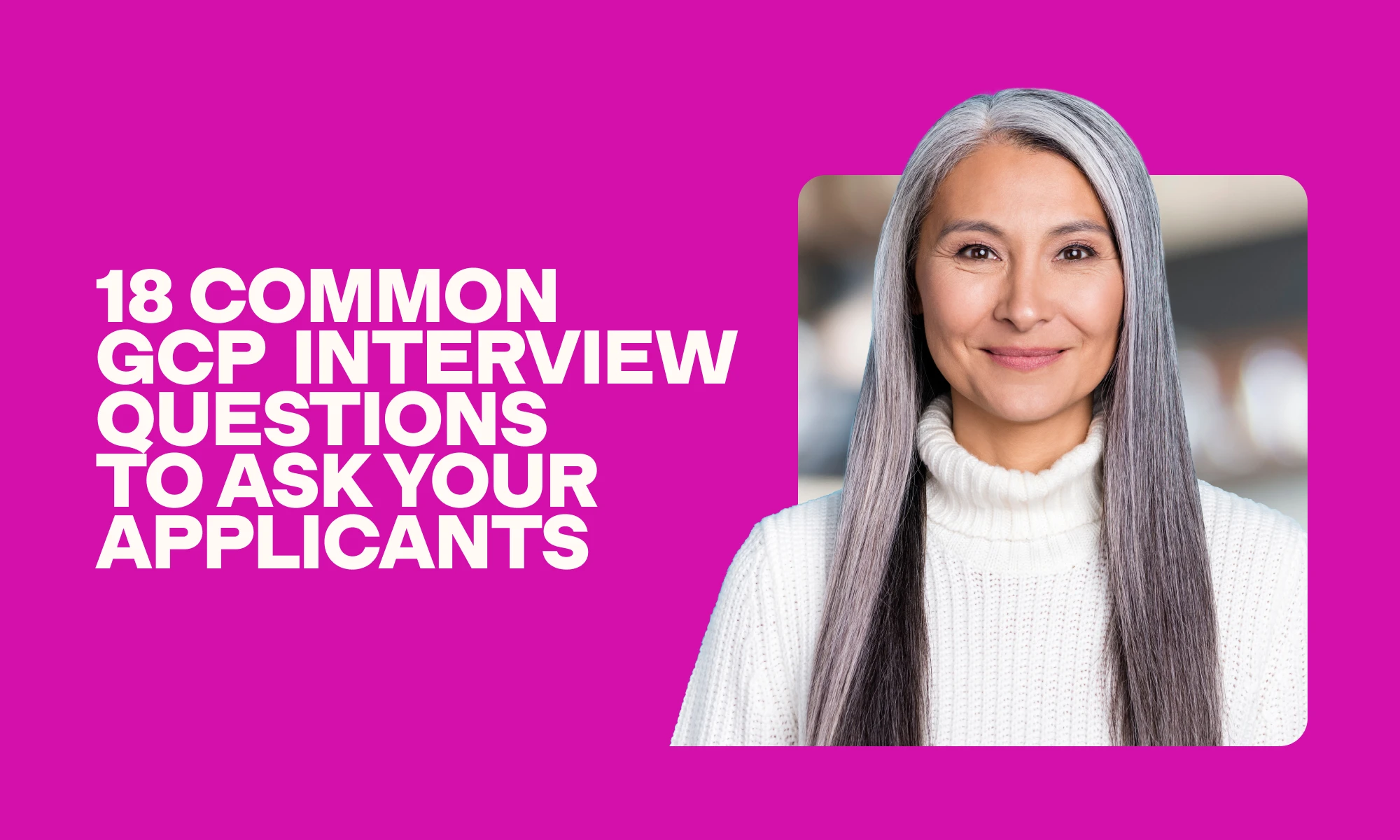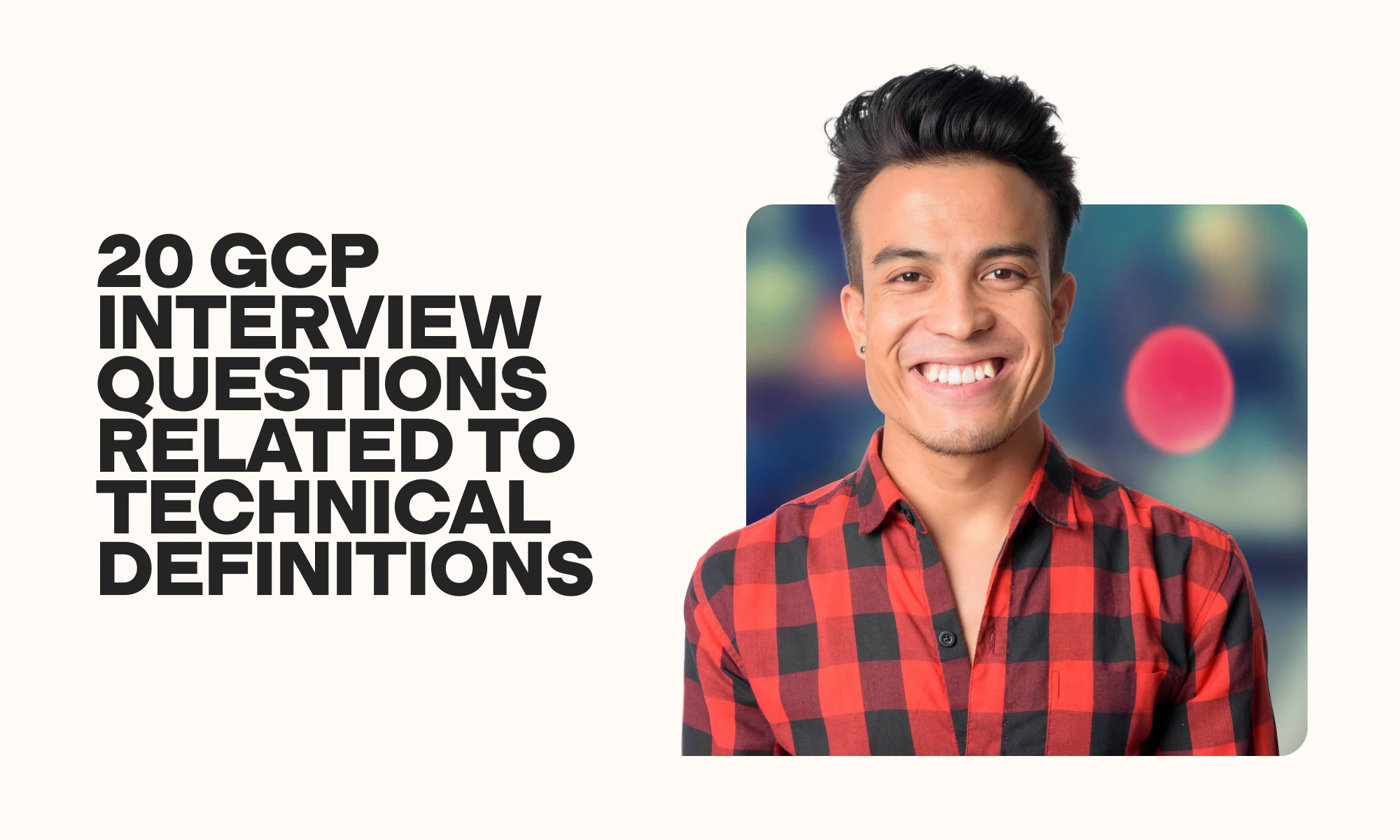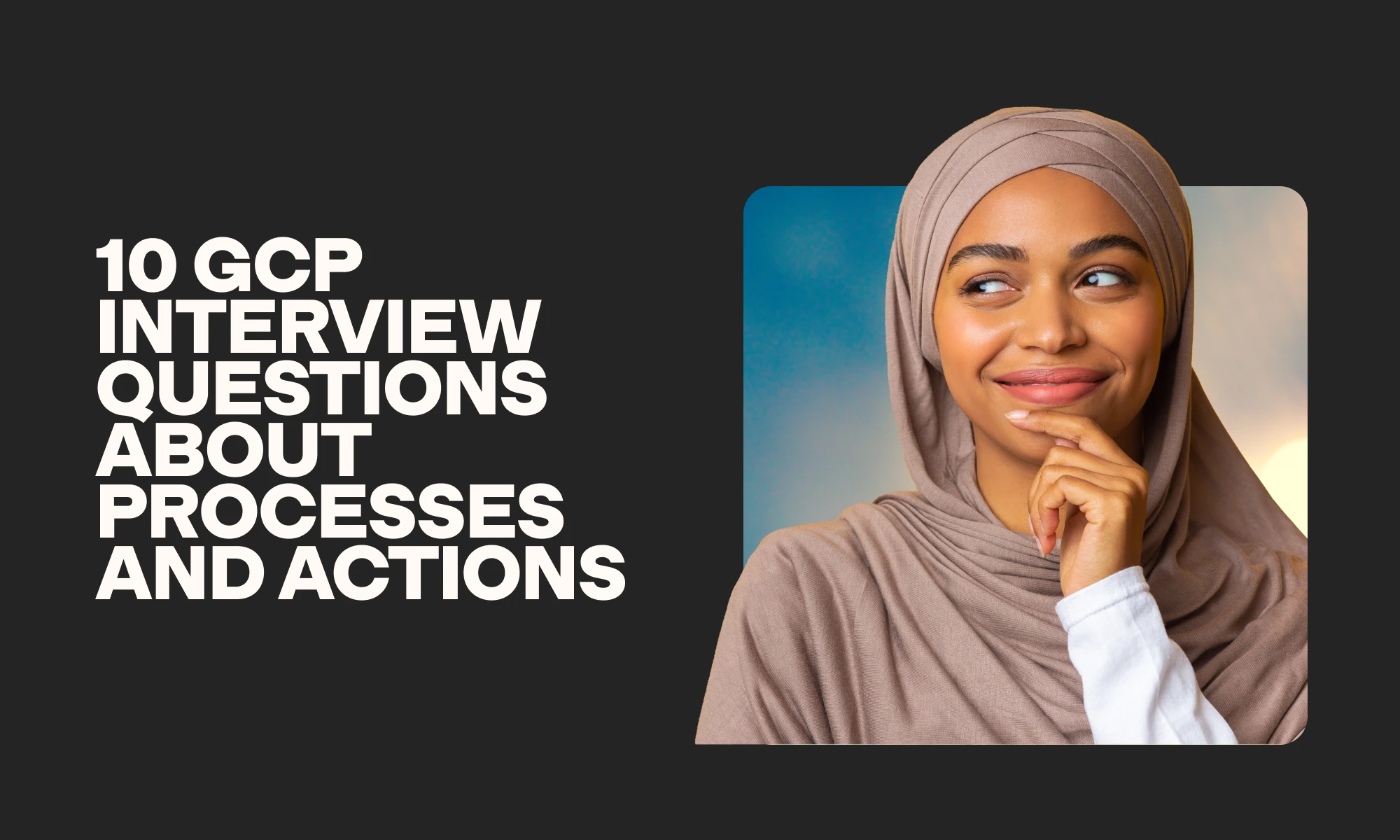48 GCP interview questions to hire an expert
Hire with confidence and find the perfect fit with TestGorilla
Skilled engineers can easily manage libraries and resources in the Google Cloud Platform (GCP). But how can you be sure you’re hiring a skilled applicant who understands the platform and knows how to make the most of it?
There are two ways: First, invite applicants to complete a Google Cloud Platform assessment and then, conduct interviews with the strongest candidates, asking relevant and insightful questions.
Assess applicants’ GCP skills with our GCP skills test and back this up with an interview, and you’re bound to find bright talent.
Here is our list of GCP interview questions to ask applicants and learn more about their knowledge and skills.
Table of contents
- 18 common GCP interview questions to ask your applicants
- 5 common GCP interview questions and answers to review applicants’ responses
- 20 GCP interview questions related to technical definitions
- 5 common GCP interview questions and answers related to technical definitions
- 10 GCP interview questions about processes and actions to ask your interviewees
- 5 GCP interview questions and answers related to processes and actions
- 7 tips for incorporating these GCP interview questions into your hiring process
- When should you use GCP interview questions in the hiring process?
- Assess cloud experts with our GCP interview questions and hire a pro
18 common GCP interview questions to ask your applicants
To learn whether applicants understand the basic features of the Google Cloud Platform, ask them some of these 18 common GCP interview questions.
Explain what cloud computing is.
Explain what the Google Cloud Platform is.
Name the main components of the Google Cloud Platform.
Name three advantages of the Google Cloud Platform.
Name three advantages of Google Cloud Hosting.
Explain what the cloud means.
Outline the key features of cloud services.
Can you name a few development models that engineers use in the cloud?
Explain why workload management in the cloud is vital for cloud architects.
Name three benefits of cloud services.
Explain what cloud computing helps engineers achieve.
Name some advantages of Google BigQuery.
Name some differences between GCP and AWS.
Which platforms do engineers use for cloud computing on a large scale?
Explain what EUCALYPTUS is in cloud computing.
Which technical skills do engineers need to use GCP successfully?
Which soft skills do GCP engineers use most frequently?
Which skills are you seeking to develop as a GCP engineer?
5 common GCP interview questions and answers to review applicants’ responses
When reviewing your applicants’ responses, you need to make sure they have the right skills to succeed.
To help you with this, we’ve provided sample answers to 5 of the common GCP interview questions from the previous section.
1. Which technical skills do engineers need to use GCP successfully?
Several technical skills are essential for using GCP. Applicants may mention that software security and cybersecurity skills are vital for using GCP. They may also state that DevOps skills and knowledge can help with making the most of GCP, based on the specific framework the team is using.
2. Which soft skills do GCP engineers use most frequently?
Soft skills that are important for GCP roles include communication and interpersonal abilities (which you can assess with our Communication skills test).
Additional soft skills your applicants may mention are problem-solving, critical thinking, and time-management skills.
3. Which skills are you seeking to develop as a GCP engineer?
Does your applicants’ passion for constant skill development shine through during the interview?
From time management to security and leadership to creativity, applicants may have various skills they want to work on. Have they taken the appropriate measures to develop them? Are they able to give examples of specific ways they’re honing their skills?
4. Can you name a few development models that engineers use in the cloud?
A range of development models is vital for GCP engineers. In addition to the community cloud, applicants may mention the public cloud or private cloud. They may also refer to the hybrid cloud when responding to this GCP interview question.
5. Which platforms do engineers use for cloud computing on a large scale?
Engineers use a few platforms for cloud computing on a large scale. A few examples applicants may mention include the Apache Hadoop framework and Amazon Web Services (AWS). The Google Cloud Platform itself is another system your candidates may mention when responding to this interview question.
The best insights on HR and recruitment, delivered to your inbox.
Biweekly updates. No spam. Unsubscribe any time.
20 GCP interview questions related to technical definitions
To determine whether your applicants have the right technical understanding of the Google Cloud Platform, ask them some of these 20 GCP interview questions about technical definitions.
Explain what Google Cloud Platform Console is.
Explain what Cloud Storage Client Libraries are.
Explain what Google Compute Engine is.
Describe the relationship between Google Compute Engine and Google App Engine.
Name three methods of Google Compute Engine API authentication.
Explain what Google BigQuery is.
Explain what Google Cloud SDK is.
Explain what Google Cloud APIs are.
Explain what instances are in GCP.
Explain what Google Cloud Machine images are.
Explain the main firewall rules in cloud computing.
Explain what autoscaling refers to in GCP.
Explain what a Google Cloud storage bucket is.
Explain what vertex AI is in Google Cloud.
Explain what Google Distributed Cloud is.
Explain what GKE autopilot is.
Explain what binary authorization refers to in Google Cloud.
Name some of the main security aspects offered by the cloud.
Explain what system integrators are.
Name the main layers in the cloud architecture.
5 common GCP interview questions and answers related to technical definitions
When assessing your applicants’ responses, you can use the answers below to five of the most important GCP interview questions related to technical definitions.
1. Name three methods of Google Compute Engine API authentication.
Since understanding authentication methods is crucial for GCP engineers, applicants should know the different approaches for this. A few examples of Google Compute Engine API authentication include:
Using the client library
Using an access token
Authenticating using OAuth 2.0
2. Name the main layers in the cloud architecture.
Thorough knowledge of the cloud architecture can help GCP engineers understand how to scale your organization’s technology. Candidates should be able to name the following layers that belong to the cloud architecture:
Application layer – a layer the end-user interacts with
Platform layer – a layer that features the OS and apps
Infrastructure layer – a layer that features storage and virtualized layers
Physical layer – a layer that features the network and physical servers
3. Name some of the main security aspects offered by the cloud.
GCP provides engineers with various security benefits. A few examples include:
Authentication and authorization, which means that only authenticated users can access the application
Identity management, which offers application-services authorization
Access control, which enables users to control or grant other users access to the cloud ecosystem
4. Explain what binary authorization refers to in Google Cloud.
Can your applicants explain that binary authorization enables users to deploy container images only if they are trustworthy? Are they aware that binary authorization works with signature validation, which ensures that engineers use confirmed container images during build and release?
5. Explain what Google Cloud Machine images are.
Applicants should know that Google Cloud Machine images enable engineers to store configurations, permissions, metadata, and multiple disk data from virtual machine instances. Can they also explain that image configuration is another functionality enabled by Google Cloud images?
10 GCP interview questions about processes and actions to ask your interviewees
To determine whether your applicants have the right skills to complete complex tasks with the Google Cloud Platform, ask them some of these 10 GCP interview questions about processes and actions.
Which method would you use to save applications, software, and drivers with no hardware?
Which method would you use to create service accounts in Google Cloud?
Explain the method you would use to create projects in GCP.
Explain the approach you would use to distinguish between project numbers and IDs.
If you accidentally delete an instance, would you be able to retrieve it?
Name three options for installation for Google Cloud SDK.
Explain how you would access a Google Cloud API.
Explain how you would view past transactions in the GCP.
How would you guarantee data security when transferring it?
What would you use EUCALYPTUS for in cloud computing?
5 GCP interview questions and answers related to processes and actions
When evaluating your applicants’ responses, you can use our answers to five of the most vital GCP interview questions on processes and actions.
1. Explain how you would view past transactions in GCP.
There are a few steps your candidates may list when explaining how to view past transactions in the Google Cloud Platform. The required steps include:
Signing into the GCP console
Navigating to the left pane and selecting billing
Selecting the go-to linked billing account option
Navigating to transactions
Applicants may also mention that it’s possible to view transactions by using transaction type, view summaries of the transaction history, or change the data range to view different transactions.
2. If you accidentally delete an instance, would you be able to retrieve it?
Skilled candidates can explain that deleted instances no longer form a part of the organization’s project. They should be able to explain that deleted instances cannot be retrieved but that in situations where engineers have simply stopped an instance, they can restart it.
3. Explain the approach you would use to distinguish between project numbers and IDs.
Cloud engineers should be aware that while they can choose a project name, the project ID is an ID that is automatically assigned by the console.
4. Which method would you use to create service accounts in Google Cloud?
When responding to this GCP interview question, applicants may explain that they can have a service account automatically created through Google Compute Engine.
5. Which method would you use to save applications, software, and drivers with no hardware?
Your applicants should be aware that magnetic disks or devices for storage are no longer required for saving applications in the world of cloud computing. Can they explain that engineers can save applications by uploading data to cloud computing services and that the data will stay in the cloud until they modify it?
Have you tried our soft skills assessments?
Level up your recruiting with soft skills assessments from TestGorilla.
7 tips for incorporating these GCP interview questions into your hiring process
Before you start interviewing highly-skilled applicants, we have seven tips on how to successfully incorporate GCP interview questions into your hiring process.
1. Use skills tests before interviews and after candidate sourcing
Using skills tests yields the best results if you do it before you conduct interviews and after you source applicants. With TestGorilla, you can combine up to five skills tests in a single assessment, and we have a vast test library to choose from.
This way, you can reliably assess candidates’ soft skills and technical expertise and only focus your attention on the ones who meet your hiring criteria for the role.
So, create a skills assessment and invite all applicants to take it as soon as you receive their applications. To shortlist applicants, you simply need to look at test results.
2. Think of the interview as an opportunity to exchange information
When interviewing applicants, consider it a chance to exchange information with applicants. Otherwise said, look at the interview as a two-way process in which you can find out more about prospective employees, and in which they can discover your organization and see if it’s the right fit for them.
To effectively exchange information with your applicants, begin by providing them with enough information about your open role and the organization as a whole. Inform them about the team and give them details about the projects they’ll be working on.
You can then ask your applicants for information about their skills and GCP experience. Don’t forget to complete the interview by inviting applicants to ask any questions they may have. Prepare to answer their questions and give them detailed information to enhance the candidate experience.
3. Consider the advantages of structured interviews when asking GCP interview questions
For the best results when interviewing applicants, we advise you to use structured interviews. This process involves asking every applicant the same set of interview questions in the same or similar order. You don’t need a rigid script, though: Asking follow-up or clarification questions is definitely still okay (and advisable).
Using structured interviews has many advantages: Not only can you guarantee that you’ll make the process fair and more consistent, but you’ll also find it easier to compare applicants’ responses to your GCP interview questions.
Another crucial advantage of structured interviews is the fact that this is a legally defensible interview method. Since you’ll ask all applicants the same questions and can establish objective criteria for hiring applicants, structured interviews are the top option that many companies choose (including Google, by the way).
4. Take notes during interviews
Later, when you’re done with the interview stage, you’ll need to compare your findings with the rest of your team. To keep track of your findings, take notes during the interview. There are a couple of methods you can use to make note-taking less uncomfortable for your interviewee.
First, always let your applicant know that you’ll take notes. Explain the purpose of your note-taking before you proceed with the interview.
Second, try to keep eye contact with your interviewee when you’re not taking notes. Try not to focus entirely on the paper or document on which you’re writing, and ensure that your focus doesn’t detract from the interviewee.
5. Review your applicants’ skills test results and interview responses
When you’ve completed all the interviews, you can now look at your applicants’ responses to your GCP interview questions and the skills tests in combination.
Picking the right applicant doesn’t have to be complicated. Top skills testing platforms like TestGorilla will calculate your applicants’ results automatically, and the notes you’ve taken during interviews will facilitate the decision-making process.
Compare your applicants’ test scores with your interview notes and discuss these results with your hiring team.
6. Offer feedback to professionals whose skills don’t match your open position
There are a couple of critical reasons you should offer feedback to GCP professionals whose skills don’t match your open position. The main advantage is that it enhances the candidate experience and your company’s reputation. Essentially, it benefits your applicants and your organization at the same time.
The second advantage of offering feedback is that your applicants may choose to develop their skills and then re-apply for a future opening with your organization. The feedback will give your applicants the chance to develop the GCP skills they lack and apply later.
7. Design training and onboarding by reflecting on skills tests and interview responses
Do you struggle to develop the right training programs for new hires?
The best way to handle this phase is to use what you’ve learned about new hires throughout the hiring process. Revisit skills test results and create programs that are a good match for the candidate you’ve hired.
When should you use GCP interview questions in the hiring process?
GCP interview questions are best used after you have given applicants a GCP skills test.
Armed with skills test results, you’ll have no problem shortlisting candidates for an interview; all you’ll need to do is check the results and select candidates based on their experience and knowledge.
In other words, source candidates, invite them to complete a GCP skills test, and interview the best applicants by using the GCP interview questions from this article.
Assess cloud experts with our GCP interview questions and hire a pro
There are obvious benefits to hiring a GCP expert for your team. Still, there are obstacles, too, including promoting your brand and keeping GCP experts curious and excited about the open role.
To clear these obstacles, use the right GCP interview questions and treat the interview as a chance to exchange information with them. Ensure you also check out the TestGorilla GCP skills test and use it right after you’ve sourced applicants.
With this combination of approaches, you’ll never fail to find the best applicants for your role. Find and hire GCP experts for your team, bias- and stress-free. Get started with TestGorilla for free today and start making better hiring decisions.
You've scrolled this far
Why not try TestGorilla for free, and see what happens when you put skills first.



















